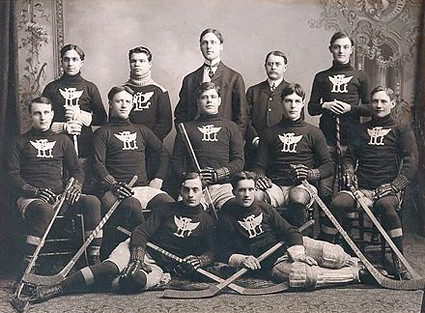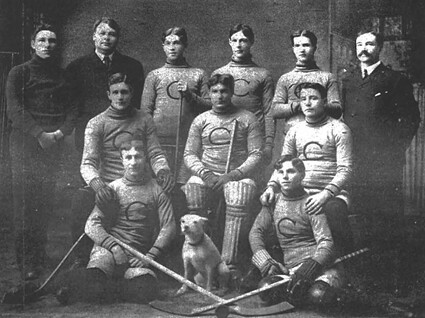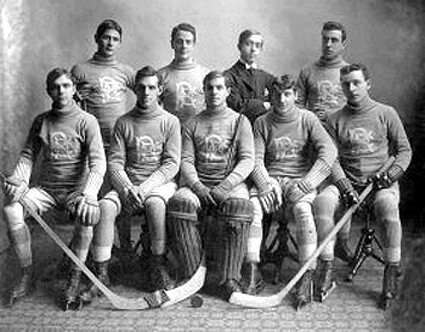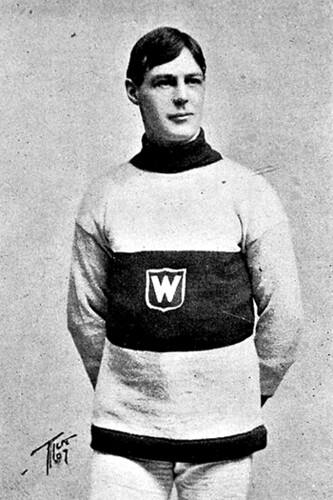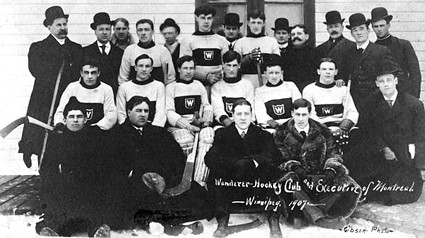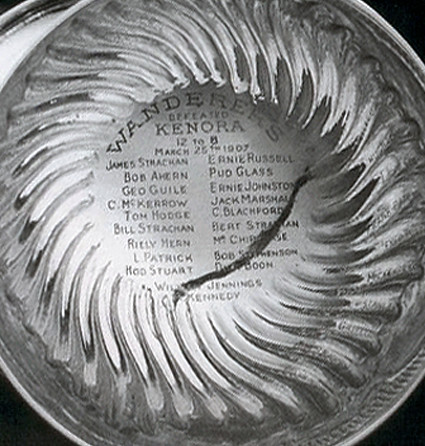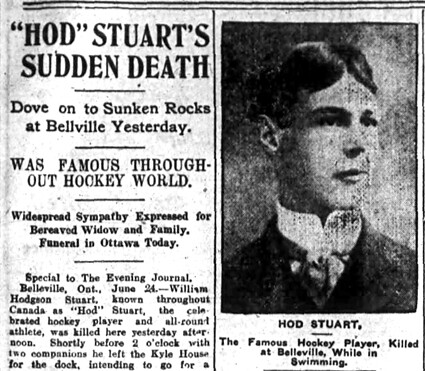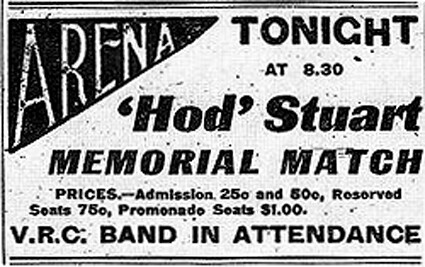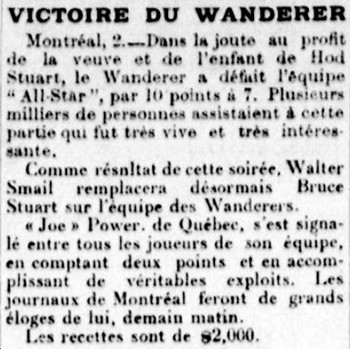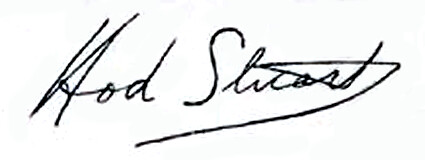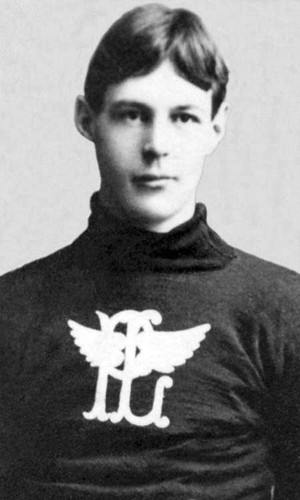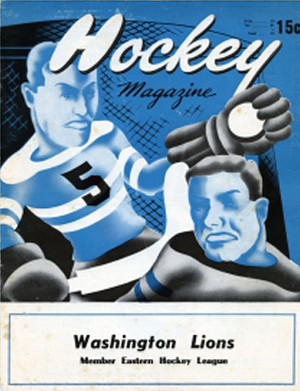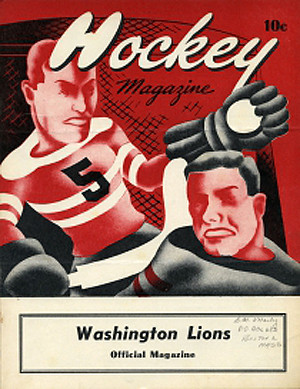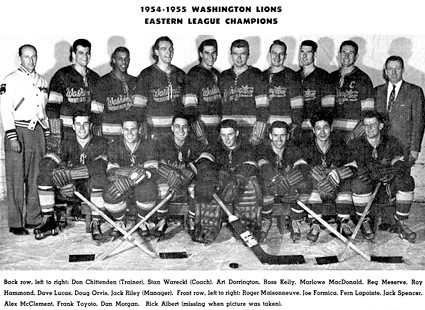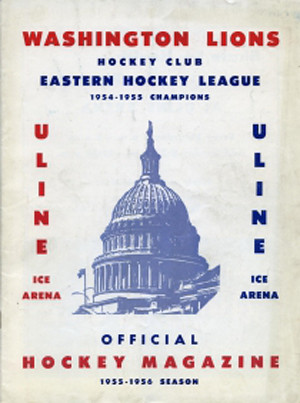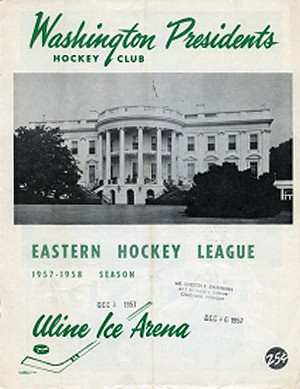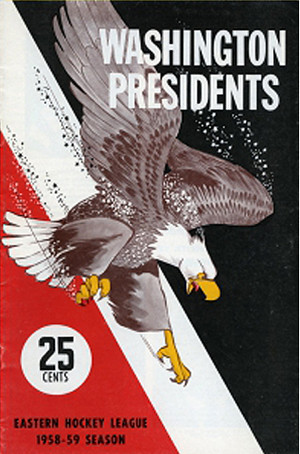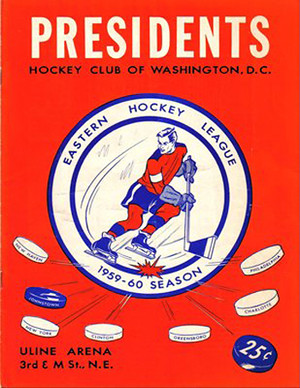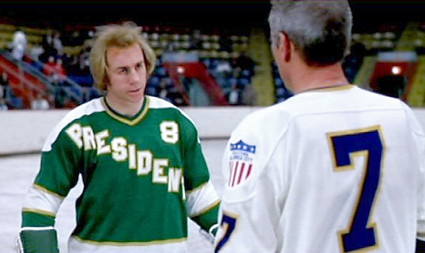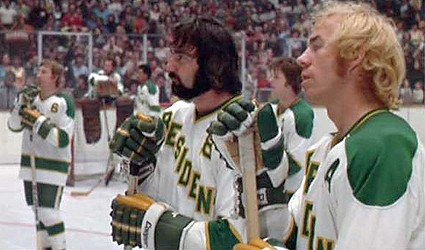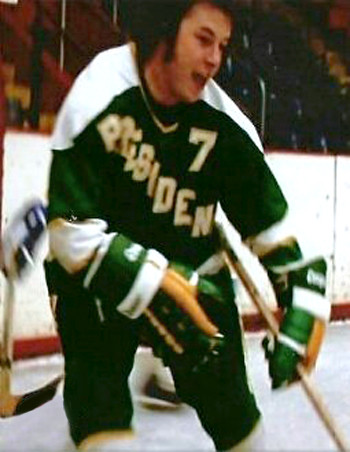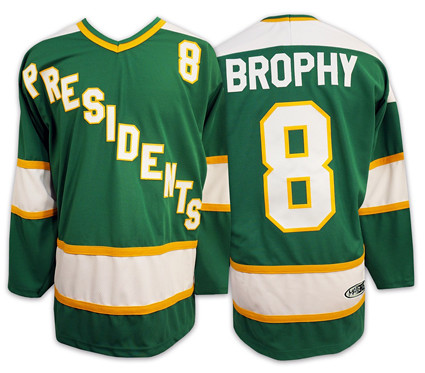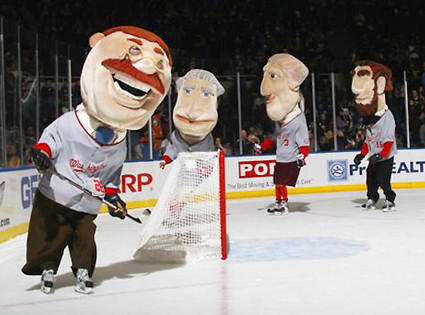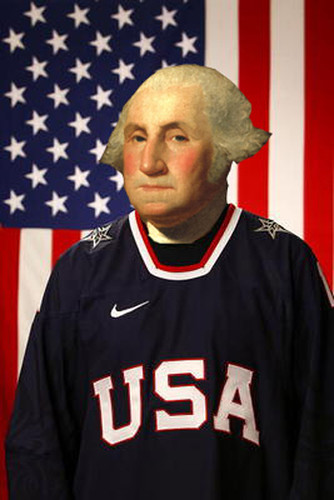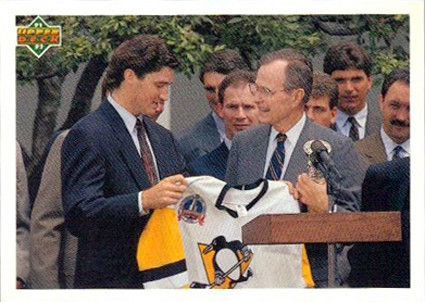Stuart returned to Ottawa HC for the 1899-00 season and was named the team captain. He played in seven of the team's eight games, scoring 5 goals, as he was not afraid to join the offense from his defensive role.
As hockey was still a purely amateur sport in those days, Stuart moved to Quebec when he was able to land a job there though his father's business contacts. The change in location led to him joining the Quebec Bulldogs, also of the CAHL, for the 1900-01 season and his brother Bruce did the same. Again, he played in seven of the club's eight games, scoring twice.
He returned for a second season with the Bulldogs in 1901-02, scoring 5 times in 8 games.
As professionalism started to come into the game, Stuart was signed for the princely sum of $15-$20 per week for the 1902-03 season by the Pittsburgh Bankers of the Western Pennsylvania Hockey League in the United States, in addition to his income from his day job in Pittsburgh. In 13 games, Stuart scored 7 goals and 8 assists with 29 penalty minutes as the Bankers finished first in the four team league with a 10-3-1 record. Stuart was named the best cover-point in the league.
After one season in Pittsburgh, Stuart moved further west with his brother Bruce to join the professional Portage Lakes Hockey Club in Northern Michigan for the 1903-04 season. The club was not part of any league that season and played a schedule of 14 exhibition games, with Stuart scoring 13 goals while Bruce had an astonishing 44!
For the 1905-06 season, the American Soo Indians and Canadian Sault were banned from competing in the amateur Ontario Hockey Association after having played against the professionals from Portage Lakes. The solution was the formation of a new, professional league, which consisted of five teams, which was dubbed the International Hockey League.
Stuart was given $1,800 to play for the Calumet Miners as well as manage their rink for the season. While Hod changed teams, Bruce remained with Portage Lakes for the next three seasons.
Stuart scored 18 goals in 22 games for the Miners, who won the league championship with a 18-5-1 record, as he was named the best cover-point in the league.
On December 11, 1905, Stuart was suspended from the league after other teams complained he had won too many championships and was too rough a player. He was reinstated on December 30th and joined the Pittsburgh Professionals for the remainder of their season, scoring 11 times in 20 games. After Pittsburgh completed their schedule, Stuart suited up for one additional game for Calumet.
Stuart began the 1906-07 season with Pittsburgh in the IPHL, but after 4 games with a goal and 3 assists, he grew increasingly frustrated with the violence and refereeing in the league and went so far as to have a letter critical of the league and its officiating. Shortly afterwards, the Pittsburgh players refused to play a game against the Michigan Soo due to the choice of referee. The club's management felt that Stuart was the instigator of the boycott and released him from the club.
Having heard earlier that the Montreal Wanderers of the Eastern Canada Amateur Hockey Association were not only interested in his services, but willing to make hm the highest paid player in hockey, signed with the Wanderers and made his debut on January 2, 1907 in front of 6,069 fans. He would eventually play in 8 of the Wanderers 10 regular season games, scoring 3 times and was one of only four professionals to play for the club that season. With Montreal, he was once again reunited with Bruce, who also played 3 regular season and 3 Stanley Cup games with the Wanderers that season.
If Stuart was unhappy with the level of violence in the IPHL, he certainly was not pleased with the events of January 12th, when the Ottawa Senators repeatedly battered the Wanderers players with their sticks, with Charles Spittal's attack on Cecil Blanchford later being described at "attempting to split his skull", while the Senators Alf Smith hit Stuart "across the temple, laying him out like a corpse", while Harry Smith broke Ernie Johnson's face, breaking his nose. Reports of the game commended Stuart, stating that he neither flinched or retaliated, even after bearing most of the hits.
At a special league meeting, the Montreal Victorias proposed suspending Spittal and Alf Smith for the rest of the season, which was voted down and eventually led to the league president Fred McRobie resigning. When the Senators returned to Montreal, Spittal, Alf Smith and Harry Smith were all arrested, with Spittal and Alf Smith eventually paying $20 fines.
On January 17th and 21st, the Wanderers faced a challenge for the Stanley Cup they had won the previous March. Kenora, the 1906 Manitoba champions, pulled off an upset, wresting the cup away from the Wanderers by winning 4-2 and 8-6.
Afterwards, the Wanderers focused on their ECAHA schedule, and racked up win after win, eventually finishing the season as league champions after a perfect 10-0 undefeated season with Stuart contributing 3 goals in eight games.
That championship earned them the right to a rematch with Kenora, which took place on March 23rd and 25th in Winnipeg. Montreal dominated the first game 7-2, and even though the Thistles won Game 2 by a score of 6-5, the Wanderers large margin of victory in the first game gave them ta 12-8 win in the two game, total goals series, giving Stuart a Stanley Cup championship.
In celebration of their championship, the Wanderers engraved the names of their entire roster inside the bowl of the Stanley Cup, the first winning team to do so in what is now and annual tradition.
Tired of the violence in hockey, Stuart quit playing hockey after the Stanley Cup matches and joined his father in the construction business. As part of his duties, he was sent to Belleville, Ontario to oversee a construction project. On the afternoon of June 23, 1907, he went swimming with some friends and swam to a nearby lighthouse, climbed on a platform and dove onto some obscured rocks in the shallow water and died instantly of a broken neck at the age of 28 just three months after he and the Wanderers won the Stanley Cup in 1907.
On January 2, 1908 (nine years before the creation of the National Hockey League) an all-star benefit game was held as a benefit for the family of Stuart with the tickets sold out days in advance.
In that first all-star game ever held in any sport, the Montreal Wanderers faced off against a team of players from the Eastern Canada Amateur Hockey Association with the game hosted at no charge by the Westmount Arena in front of 3,800 fans, raising over $2,100 for his widow and two children.
The Wanderers led 7-1 after the first half of the contest, but the All-Stars, which consisted of players from the Ottawa Senators, Montreal Victorias, Montreal Amateur Athletic Association, Montreal Shamrocks and Quebec Bulldogs, fought back to make it a game, but the Wanderers prevailed by a final score of 10-7.
Stuart was inducted into the Hockey Hall of Fame in 1945, one of the original nine honored members of the inaugural class along with Hobey Baker, Charlie Gardiner, Eddie Gerard, Frank McGee, Howie Morenz, Tommy Phillips, Harvey Pulford and Georges Vezina.
Today's featured jersey is a 1903-04 Portage Lakes Hockey Club Hod Stuart jersey. The Portage Lakes Hockey Club was founded back in 1899 and began to pay its players in 1902. They introduced their winged logo for the 1902-03 season with sweaters that had white shoulders and turtleneck collar. For the following season they sweaters became a solid color and remained so through their final season of 1906-07 when the IPHL folded and the Portage Lakes club along with it. We have seen a single mention that the team's sweaters were green, but cannot be certain of this.
Noteworthy players enticed by the lure of being paid to play hockey who suited up for Portage Lakes at times included Hall of Famers "Bad" Joe Hall, Riley Hern, Bruce Stuart, Hod Stuart and Fred "Cyclone" Taylor.


